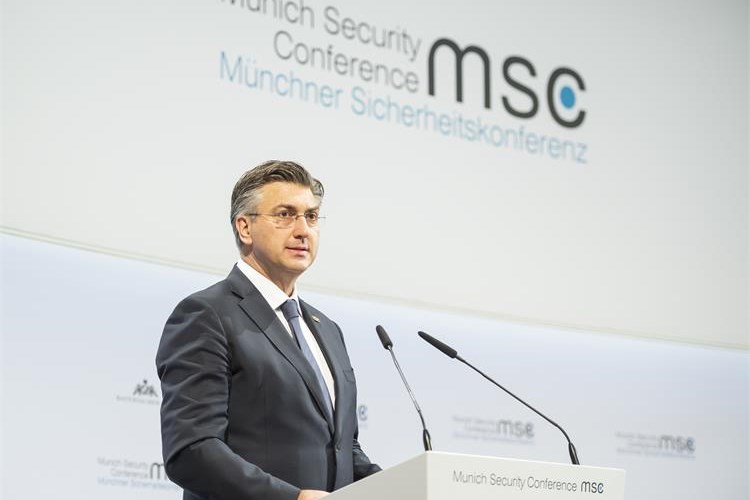- Published: 16.02.2020.
Plenkovic defends rule of law as foundation of "a Europe that protects"
Europe should reach a new consensus on how to protect its citizens and that consensus should be based on the rule of law, Croatian Prime Minister Andrej Plenkovic said on Sunday.
Speaking at the Munich Security Conference 2020, Plenkovic said that due to differences between member-states, citizens' expectation to feel safe had not been entirely met.
Plenkovic, whose country is chairing the EU, said that the new consensus should be based on European values, primarily the rule of law.
The rule of law is the main foundation of our values, he stressed.
Democracy, fundamental freedoms and the rule of law strengthen one another to the point where one cannot exist without the other, he said.
Slovakian President Zuzana Caputova, too, defended the foundations of liberal democracy in Europe, saying that the rule and spirit of law must remain intact.
Only then can we have a Europe that fully protects. The rule of law in its essence is about respect for the truth, she said.
The two officials did not mention explicitly any EU member country but EU members Hungary and Poland are faced with criticism that they violate European values, which is why they could lose their voting rights and money from European funds.
The ruling Hungarian party Fidesz of Prime Minister Viktor Orban was suspended over breaches of European values from the European People's Party (EPP), to which PM Plenkovic's HDZ belongs.
"A Europe that protects" was a topic of discussion at the leading world forum on international security policy in Munich and it is one of the priorities of Croatia's EU presidency in the first half of 2020.
The new European guidelines in the area of freedom, security and justice will be based on mutual trust, territorial integrity and new technologies and artificial intelligence, Plenkovic said.
Those principles will continue to be developed in a new pact on migration and asylum which the European Commission is expected to present in the spring.
Despite differences between member-states, there is an agreement on the pact's goals, primarily the need to simplify the asylum system so that decisions can be made in the most efficient way and in the interest of all persons involved, said Plenkovic.
We need a more organised management of migrations, with real time monitoring, early warnings and a joint coordinated response, he added.
Zagreb will also advocate assistance by the European Border and Coast Guard Agency to Southeast European countries in the protection of their borders and in halting illegal migrations before they reach EU borders.
Speaking of threats that require a joint European response, Plenkovic also cited terrorism, cyber attacks, hybrid warfare, terrorist content on the Internet, child sexual abuse and protection of critical infrastructure and public spaces.
Text: Hina
